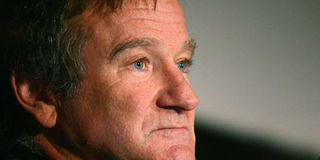Robin Williams’ death brings to fore danger of depression

US actor Robin Williams during a photo call of The Big White, directed by Mark Mylod, in Rome on November 15, 2005. Williams, who suffered from depression, endeared himself in a wide range of films and performances. AFP PHOTO | TIZIANA FABI | FILES
What you need to know:
- Americans are focused this week on the death of an actor and comedian, Robin Williams (right), who committed suicide at his San Francisco home.
- Untreated symptoms of depression are the leading cause of suicide in America. Yet, many do not seek help because they are afraid of being tagged mentally ill.
- National pundits could not resist taking advantage of the circumstances.
A massive convoy of Russian trucks is suspiciously approaching the Ukraine border under the guise of providing humanitarian aid.
A human tragedy is unfolding in Iraq as religious minorities flee ruthless militants. In between ceasefires, Israel and Hamas are tossing threats and rockets as they continue their fight over the future of Gaza.
Yet, Americans are focused this week on the death of an actor and comedian, Robin Williams (right), who committed suicide at his San Francisco home.
This may seem silly with Ebola running rampant in Central Africa, and millions mourning in Brazil over the death of a presidential candidate in a plane crash. But this week was a time in America to focus on one of our own.
Williams, who suffered from depression, endeared himself in a wide range of films and performances. The only thing faster than his mouth, a critic for The New York Times said this week, was Williams’ mind.
MANY DON'T SEEK HELP
My children grew up loving him in roles like Peter Pan in Hook and Popeye. I admired his films, such as Good Will Hunting and his many funny onstage performances. A search of YouTube will find a particularly hilarious and profane recounting by Williams of how and why the Scottish invented golf.
Williams’ death has also helped us focus on depression. It is a dangerous illness that lurks behind the mask of everyday life. One in 10 adult Americans suffer from depression, according to the Center for Disease Control.
Untreated symptoms are the leading cause of suicide in America. Yet, many do not seek help because they are afraid of being tagged mentally ill.
Williams’ death also sparked controversy within the media. The coroner’s office produced a report that gave graphic details about the way that Williams committed suicide.
Many felt that newspapers, radio and television reporters went too far in spelling out the specifics. Critics said that Williams’ family deserved more privacy.
RAINING FLOWERS
National pundits could not resist taking advantage of the circumstances. Rush Limbaugh, a conservative commentator who is famous for weighing in on such occasions, said that Williams’ “leftist” viewpoints may have led him to take his life.
Then, he recanted, and said that the “leftist” media had misquoted him and had mishandled the Williams’ story. Most of us, though, are simply sad to have lost a brilliant actor and comedian.
It is a dangerous illness that lurks behind the mask of everyday life.
Jimmy Fallon, who is a television talk show host, perhaps said it best with this short burst on Twitter: “Took a walk in NYC this morning under a tree-lined street. Perfect breeze. Looked like it was raining flowers. I know that was you, Robin.”
Or as former President John F. Kennedy once said: “A nation reveals itself not only by the men it produces but also by the men it honours, the men it remembers.”




